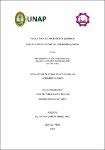Obtención de biocombustible sólido a partir de residuos de frutas

View/
Date
2021Author
Lopez Del Rio, Jhofre Pablo
Robalino Inuma, Moises
Metadata
Show full item recordAbstract
The main objective of this work was: to obtain solid biofuel from fruit residues, in order to take advantage and be used later in heating systems. The work carried out has a quantitative approach with a descriptive correlational depth level. The study population was the fruit residues from the markets of Bethlehem, central market and model market, the type of sampling is probabilistic at the discretion of the researchers, considering the sample size a maximum of 1k, 500 grams (500 gr Nativity market, 500 gr. Central market and 500 gr. Model market). The sources from which the data were obtained such as: data collection, weighing, humidity, ash, grinding, sieving, obtaining pellets and calorific value, were undergraduate and postgraduate theses as well as an internet source. The results obtained from the 3 samples analyzed, from the Bethlehem, Central and Model markets resulted in a high calorific value M1:9549.74 kcal / kg, M2: 95551.36 kcal / kg, M3: 9671.36 kcal / kg, M4: 9483, 4 kcal / kg which correspond to 4 samples produced respectively. In conclusion, it was shown that a biofuel can be obtained with optimal energy combustion with fruit residues. El objetivo principal de este trabajo fue: obtener biocombustible solido a partir de residuos de frutas, con el fin de aprovechar y sean utilizados posteriormente en sistemas de calentamiento. El trabajo realizado tiene enfoque cuantitativo con nivel de profundización descriptivo correlacional. La población de estudio, fue los residuos de frutas de los mercados de belén, mercado central y mercado modelo, el tipo de muestreo es probabilístico a criterio de los investigadores, considerándose el tamaño de la muestra un máximo de 1k, 500 gramos (500 gr. Mercado belén, 500 gr. Mercado central y 500 gr. Mercado modelo). Las fuentes de donde se obtuvieron los datos como: recolección de datos, pesado, humedad, ceniza, molienda, tamizado, obtención de pellets y poder calorífico, fueron tesis de pre y posgrado además de fuente de internet. Los resultados obtenidos de las 3 muestras analizadas, de los mercados de belén, central y modelo dieron como resultado un alto poder calorífico M1: 9549,74 ????????/??g, M2: 95551,36 ????????/????, M3: 9671,36 ????????/???? M4: 9483,4 ????????/???? los cuales corresponden a 4 muestras elaboradas respectivamente. En conclusión, se demostró que se puede obtener un biocombustible con una óptima combustión energética con residuos de frutas.
Collections
- Tesis [198]

